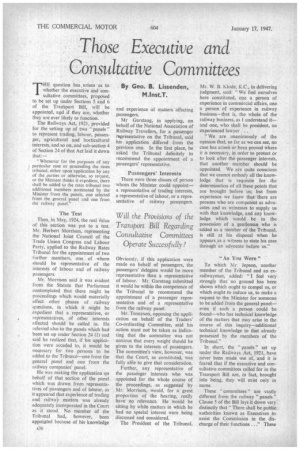Those Executive and Consultative Committees
Page 46

If you've noticed an error in this article please click here to report it so we can fix it.
By Geo. B. Lissenden, M.Inst.T. THE question has _arisen as to whether the executive and consultative committees; proposed to be set up under Sections 5 and 6 of the Transport Bill, will be appointed, and if they are, whether they are ever likely to function.
The Railways Act, 1921, provided for the setting up of two " panels " to represent trading, labour, passenger, agricultural and horticultural interests, and so on, and sub-section 4 of Section 24 of that Act laid it down that:—
" Whenever for the purposes of any particular case or proceeding the rates tribunal, either upon application by any of the parties or otherwise, so request, or the Minister thinks it expedient, there shall be added to the rates tribunal two additional members nominated by the Minister from the panels, one selected from the general panel and one from the railway panel."
The Test Then, in May, 1924, the real value of this section was put to a test. Mr. Herbert Morrison, representing the National Joint Council of the Trade Union Congress and Labour Party, applied to the Railway Rates Tribunal for the appointment of two further members, one of whom should be representative of the interests of labour and of railway passengers.
Mr. Morrison said it was evident from the Statute that Parliament contemplated that there might be proceedings which would materially affect other phases of railway questions, in which it might be expedient that a representative, or representatives, of other interests affected should be called in. He referred also to the panels which had been set up tinder Section 24 (1) and said he realized that, if his application were acceded to, it would be necessary for two persons to be added to the Tribunal—one from the general panel and one from the railway companies' panel.
He was making the application on behalf of that section of the panel which was drawn from representatives of passengers and of labour, as it appeared that experience of trading and railway matters was already adequately incorporated in the Court as it stood. No member of the Tribunal had, however, been appointed because of his knowledge
and experience of matters affecting passengers.
Mr Garstang, in applying, on behalf of the National Association of Railway Travellers, for a passenger representative on the Tribunal, said his application differed from the previous one. In the first place, he asked the Tribunal definitely to recommend the appointment of a passengers' representative.
Passengers' Interests
There were three classes of person whom the Minister could appoint— a representative of trading interests, a representative of labour, or a representative of railway passengers.
Obviously, if this application were made on behalf of passengers, the passengers' delegate would be more representative than a representative of labour. Mr. Garstang submitted it would be within the competence of the Tribunal to recommend the appointment of a passenger representative and of a representative from the railway panel.
Mr. Tennyson, opposing the application on behalf of the Traders' Co-ordinating Committee, said his action must not be taken as indicating that the committee was not anxious that every weight should be given to the interests of passengers. The committee's view, however, was that the Court, as constituted, was fully able to give that consideration.
Further, any representative of the passenger interests who was appointed for the whole course of the proceedings, as suggested by Mr. Morrison, would, for a great proportion of the hearing, really have no relevance. He would be sitting by while matters in which he had no special interest were being discussed and considered.
The President of the Tribunal, Mr. W. B. Klode, K.C., in delivering judgment, said: "We find ourselves here constituted, one a person of experience in commercial affairs, one a person of experience in railway business—that is, the whole of the railway business, as I understand Rand one, who shall be president, an experienced lawyer . . .
"We are unanimously of the opinion that, so far as we can see, no case has arisen or been proved where it is necessary, in order to protect or to look after the passenger interests, that another member should be appointed. We are quite conscious that we cannot embody all the knowledge that is requisite for the determination of all these points that are brought before us; but from experience we know that-there are persons who arc competent as advocates and as witnesses to supply us with that knowledge, and any knowledge which would be in the possession of a gentleman who is added as a -member of the Tribunal, is still at his disposal when he appears as a witness to state his case through an advocate before us."
"As You Were"
To which Mr Jepson, another member of the Tribunal and an ex
railwayman, added: "I feel very
strongly that no ground has been shown which ought to compel us, or which ought to induce us, to make a request to the Minister for someone to be added from the general panel— even if such a person could be found—who has technical knowledge of the matters that may arise in the course of this inquiry—additional technical knowledge to that already possessed by the members of the Tribunal."
In short, the " panels" set up under the Railways Act, 1921, have never been made use of, and it is feared that if the executive and consultative committees called for in the Transport Bill are, in fact, brought into being, they will exist only in name.
These " committees " are vastly different from the railway "panels" Clause 5 of the Bill lays it down very distinctly that "There shall be public authorities known as Executives to assist the Commission in the, discharge of their functions ..." These












































































